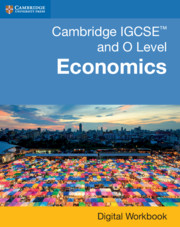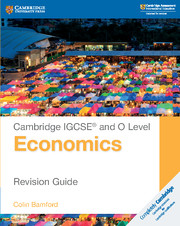Cambridge IGCSE® and O Level Economics Coursebook
Overview
This series helps students understand economic theory, terminology and principles. It matches the Cambridge IGCSE and O Level Economics syllabuses. The coursebook helps students apply tools of economic analysis, make judgements on economic issues, use basic economic numeracy and literacy, and take greater part in decision-making processes in everyday life. Sample questions provide opportunities for students to develop their evaluative skills. It provides a foundation for advanced study in Economics such as A Level. Answers to the coursebook and workbook questions are in the teacher's resource.
Features
- Introduces topics and presents economic concepts in the context of the learner, making Economics relevant to everyday life.
- Equips students with an understanding of the language of Economics and supports the development of their evaluative skills with essay questions.
- Key terms highlight and explain important concepts, helping students produce clear and accurate answers.
- A range of new practice exercises builds students' Economics skills and confidence with the subject.
- Provides the most comprehensive support for students.
- Group activities encourage peer support and provide opportunities for students to express themselves.
- The series also includes a workbook, revision guide, teacher's resource and Elevate enhanced edition.
- Endorsed by Cambridge International Examinations, Cambridge IGCSE and O Level Economics covers the Cambridge IGCSE syllabus (0455) and the Cambridge O Level syllabus (2281), first assessment 2020.
Contents
- Introduction
- Section 1. The basic economic problem
- Chapter 1. The nature of the economic problem
- Chapter 2. Factors of production
- Chapter 3. Opportunity cost
- Chapter 4. Production possibility curves
- Examination practice
- Section 2. The allocation of resources
- Chapter 5. Microeconomics and macroeconomics
- Chapter 6. The role of markets in allocating resources
- Chapter 7. Demand
- Chapter 8. Supply
- Chapter 9. Price determination
- Chapter 10. Causes of price changes
- Chapter 11. Price elasticity of demand
- Chapter 12. Price elasticity of supply
- Chapter 13. Market economic system
- Chapter 14. Market failure
- Chapter 15. Mixed economic system
- Examination practice
- Section 3. Microeconomic decision makers
- Chapter 16. Money and banking
- Chapter 17. Households
- Chapter 18. Workers
- Chapter 19. Trade unions
- Chapter 20. Firms
- Chapter 21. Firms and production
- Chapter 22. Firms? costs, revenue and objectives
- Chapter 23. Market structure
- Examination practice
- Section 4. Government and the macroeconomy
- Chapter 24. The role of government
- Chapter 25. The macroeconomic aims of government
- Chapter 26. Fiscal policy
- Chapter 27. Monetary policy
- Chapter 28. Supply-side policy
- Chapter 29. Economic growth
- Chapter 30. Employment and unemployment
- Chapter 31. Inflation and deflation
- Examination practice
- Section 5. Economic development
- Chapter 32. Living standards
- Chapter 33. Poverty
- Chapter 34. Population
- Chapter 35. Differences in economic development between countries
- Examination practice
- Section 6. International trade and globalisation
- Chapter 36. International specialisation
- Chapter 37. Free trade and protection
- Chapter 38. Foreign exchange rates
- Chapter 39. Current account of the balance of payments
- Examination practice
- Index.
Brighter Thinking Blog
Keep up to date with the latest classroom tips and educational trends from our brighter thinkers.
Visit the blogCatalogues and Ordering
Looking for something in particular or just browsing? View our catalogues to see our full range of print and digital books.
View and downloadAdvice on useful tools
Advice on useful tools, activities and timetabling from teachers experiencing school closures.
Cambridge GO
All our supporting resources have now moved to Cambridge GO – the new home for your Cambridge digital content.
Listen to our podcast
Listen to our podcast to discover teaching inspiration & advice from leading educational thinkers.








